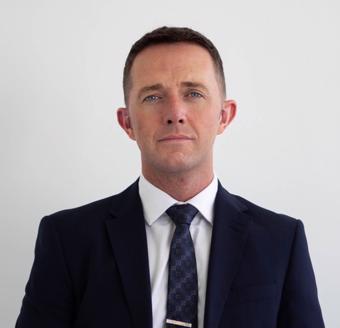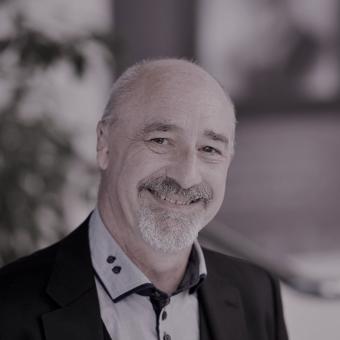The managing partner of Scottish firm Wright, Johnston & Mackenzie LLP (WJM) tells The Brief about the ongoing opportunities advising renewable energy developers, the importance of business skills for lawyers facing an AI-enabled future, and the recent investment made in his firm by Irwin Mitchell.
Fraser Gillies is managing partner of Wright, Johnston & Mackenzie, a Scottish firm that traces its history back 170 years and has offices in Glasgow, Edinburgh, Inverness, Dunblane and Dunfermline.
Founded in Glasgow, the firm began expanding geographically in the 1980s when it opened its Edinburgh office, and at times during its history it has had operations in various parts of Scotland. More recently its expansion has accelerated, opening its Inverness office in 2016 and the following year merging with Dunblane firm BMK Wilson.
Then, in 2018, Wright, Johnston & Mackenzie merged with CCW, establishing its presence in Dunfermline. The firm now employs around 150 people in total, 33 of them partners.
A full-service firm, it has key strengths in private client, which makes up about 40 per cent of the firm’s current turnover, corporate and commercial and commercial property. The firm is particularly well-known in its work advising the developers of renewable energy projects, especially onshore wind.
Another key market for the firm is family businesses and owner-managed businesses. As Gillies points out, this involved cross-pollination between the corporate and commercial and private client departments, helping feed work to both while providing clients with a holistic service.
Irwin Mitchell
On 1 February 2024, the national, full-service, law firm Irwin Mitchell completed an investment in Wright, Johnston & Mackenzie.
The transaction came about, Gillies says, after the two firms got to know each other as members of an international network through which they would refer work to one another.
“We weren’t actively looking for this type of opportunity, but we were keeping an eye on the future of legal markets in Scotland and we could see some headwinds for smallish commercial or full-service firms,” he explains.
Knowing what we did about the quality of Irwin Mitchell’s people, the services they offer, and that their approach to clients was quite similar to ours, we thought it was at least worthy of further exploration.
Business skills
The Brief sometimes speaks to people who always planned to enter the law, often fuelled by childhood enthusiasm for TV dramas like Rumpole of the Bailey, but Gillies was not one of them.
“I didn’t have a burning ambition to be a lawyer when I was a kid,” he explains. “In those days, if you were doing reasonably well at school, your careers adviser would suggest a career in the law or medicine, or something traditional like that.
“I applied for a variety of different degree courses and hadn’t really made up my mind until I received offers to do law.”
If choosing to study law was to some degree accidental, his decision to attend Strathclyde University was not.
He says, “When I did my degree Strathclyde was quite a business-focused university, with a very good business school alongside the law school.
Even at that early stage, I thought that a career in the law was a career in business, and that as well as understanding the black-letter law you’ve got to understand that you are in business.
Since Gillies’ time as a student, these business skills have only become more important for lawyers. AI, Gillies says, will inevitably change the way the law is practised, taking over many of the routine tasks that might currently be carried out by junior lawyers.
“Younger lawyers will need to work with AI the way lawyers have always learned to work with new tools when they have become available,” he says. “But it’s not going to remove the need for problem solving and the benefit of experience, and it’s not going to remove the need to be able to build a relationship with a client and to give them comfort, advice and assurance, which you can only really do face-to-face.”
Planning to succeed
Upon graduation in 2000, Gillies secured a training contract at Wright, Johnston & Mackenzie, and qualified into a role in commercial litigation in the firm’s Edinburgh office.
After several years as a litigator, he branched out into planning work, and has developed a specialism in renewable energy developments, particularly onshore wind farms. He became a partner at the firm in 2009 and was elected managing partner in 2016.
He developed his specialism in advising developers of wind farms in Scotland because, at the time he began working for them, the firm had built a reputation in that area but didn’t currently have anyone else dealing with them.
“I could see that it was going to be a growth area,” he says.
The firm now has a four-strong planning team, consisting of Gillies, partner Nicola Martin and associates Elizabeth Tainsh and Amy McDougall. Although Gillies still does still retain some key client-facing work for a small group of clients, his responsibilities as managing partner mean that the lion’s share of the department’s work, which is “almost exclusively in renewables”, is carried out by the rest of the team.
A sustainable future
His practice area is, Gillies says, one which offers plenty of opportunities for ambitious lawyers.
“Scotland still has very ambitious climate change targets, which are going to involve the deployment of a lot more on and offshore wind projects, as well as other technologies like solar, batteries, hydrogen and so on. It’s a sector that’s going to be active for the next few decades, so there’s always be plenty of opportunities,” he says.
Tackling climate change is one of the biggest issues of our time so the ability to play a part in it as part of your professional life by helping those projects become a reality is quite rewarding.
The ability to work with a developer long-term and see a projects progress from inception through to completion, which can often take a number of years, is another attraction, he says.
And, while the legal work, which might involve public inquiries as well as piecing together all the different consents and permissions required for what are often complex projects is intellectually rewarding, it does have another perk, which Gillies acknowledges: “You also sometimes get to go out and look at potential sites which, because of the nature of the projects, can take you to some fantastic corners of the country.
“It’s a real privilege to have the opportunity to do that as part of your professional life.”
Visit
Connect with Fraser Gillies via LinkedIn










